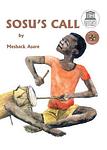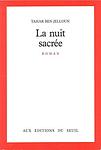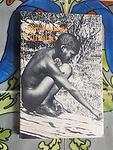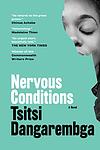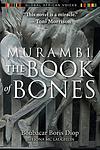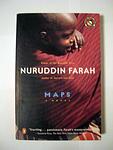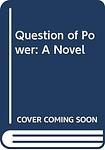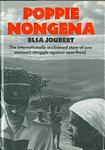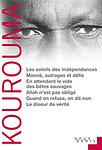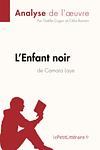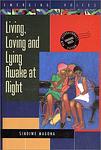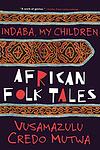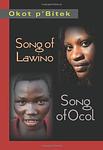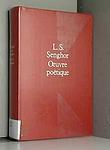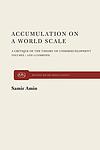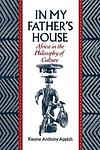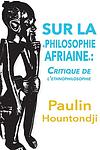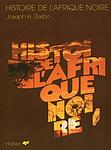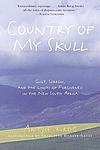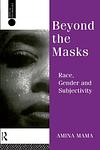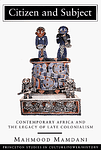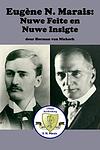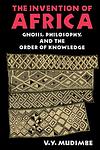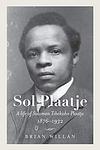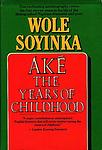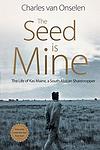Africa's 100 Best Books of the 20th Century
This is one of the 284 lists we use to generate our main The Greatest Books list.
-
Sosu's Call by Meshack Asare
"Sosu's Call" tells the story of a young boy named Sosu, who is born without the ability to walk. Despite this physical limitation, Sosu possesses a remarkable talent for carving beautiful objects out of wood. When his village is hit by a devastating storm, Sosu's bravery and resourcefulness are put to the test as he must find a way to save his community from the aftermath of the disaster. Through determination and the power of his artistic gift, Sosu becomes a symbol of hope and inspiration for his village.
-
Adventures Of A Breath by Hayam Abbas Al-Homi
"Adventures Of A Breath" is a captivating and thought-provoking novel that follows the journey of a young protagonist as they navigate through life's challenges and explore the depths of their own existence. Through vivid storytelling and poetic prose, the author delves into themes of self-discovery, love, loss, and the pursuit of one's dreams. This beautifully crafted narrative invites readers to reflect on the fragility and beauty of human existence, ultimately leaving them with a sense of hope and inspiration.
-
Stories From A Shona Childhood by Charles Mungoshi
"Stories From A Shona Childhood" is a captivating memoir that delves into the author's experiences growing up in a rural village in Zimbabwe. Through a collection of poignant and vividly recounted anecdotes, the book offers a glimpse into the customs, traditions, and challenges faced by the Shona people. With a blend of humor, nostalgia, and cultural insights, the author paints a rich and heartfelt portrait of his childhood, highlighting the importance of community, family, and storytelling in shaping his identity.
-
Mamy Wata Et Le Monstre by Veronique Tadjo
"Mamy Wata Et Le Monstre" by Veronique Tadjo is a captivating tale that explores the relationship between humans and nature. Set in a coastal village, the story follows the adventures of a young girl named Mamy Wata, who discovers a mysterious monster wreaking havoc on her community. As she embarks on a journey to confront the monster, Mamy Wata learns valuable lessons about the importance of harmony and respect for the environment. With its vivid imagery and thought-provoking narrative, this book serves as a reminder of the delicate balance between humans and the natural world.
-
Al Mawt `Ala Al Asfalt by `Abd al-Rahman Abnudi
"Al Mawt `Ala Al Asfalt" is a thought-provoking and powerful novel that delves into the complexities of life and death. The story follows a diverse group of characters as they navigate the streets of Cairo, each grappling with their own existential dilemmas. Through vivid and poetic prose, the author explores themes of love, loss, and the search for meaning in a chaotic world. With its rich cultural backdrop and poignant storytelling, this book offers a profound reflection on the human condition.
-
Arrow of God by Chinua Achebe
Set in Nigeria during the early 20th century, the story follows Ezeulu, the chief priest of the god Ulu, as he struggles to maintain his position of power in his village and with his own family. As the British colonial government seeks to exert control, Ezeulu finds himself caught between the traditional religious practices of his people and the new political realities. The narrative explores themes of power, tradition, change, and the clash of cultures.
-
Things Fall Apart by Chinua Achebe
This novel explores the life of Okonkwo, a respected warrior in the Umuofia clan of the Igbo tribe in Nigeria during the late 1800s. Okonkwo's world is disrupted by the arrival of European missionaries and the subsequent clash of cultures. The story examines the effects of colonialism on African societies, the clash between tradition and change, and the struggle between individual and society. Despite his efforts to resist the changes, Okonkwo's life, like his society, falls apart.
-
Anowa by Ama Ata Aidoo
"Anowa" is a thought-provoking play that delves into the complexities of love, tradition, and the clash between individual desires and societal expectations. Set in an African village, the story follows Anowa, a strong-willed and independent young woman, as she defies societal norms by rejecting potential suitors and choosing her own path. However, her unconventional choices lead to tragic consequences, highlighting the consequences of challenging traditional values and the limitations placed on women in a patriarchal society.
-
O Testamento Do Sr. Napumoceno Da Silva Araújo by Germano Almeida
"O Testamento Do Sr. Napumoceno Da Silva Araújo" is a captivating novel that delves into the life and legacy of the enigmatic Mr. Napumoceno Da Silva Araújo. Set in Cape Verde, the story follows the unraveling of Mr. Araújo's last will and testament, which reveals his wealth, eccentricities, and the complex web of relationships he had with his family, friends, and business associates. Through a blend of humor, satire, and social commentary, the book explores themes of greed, power, and the human condition in a postcolonial society.
-
The Beautyful Ones are Not Yet Born by Ayi K. Armah
The novel explores the life of a railway clerk in Ghana who refuses to accept the corruption that is rife in his society. Despite his family's struggles with poverty, he remains steadfast in his moral convictions, rejecting the easy path of bribery and deception. The protagonist's integrity contrasts sharply with the greed and materialism of his peers, providing a stark commentary on post-colonial African society. The book is a powerful critique of corruption and a testament to the strength of individual integrity.
-
L'étrange Destin De Wangrin by Amadou Hampâté Bâ
"L'étrange Destin De Wangrin" by "Amadou Hampâté Bâ" is a captivating narrative that delves into the life of Wangrin, a complex and enigmatic figure in West African society. Through a series of interconnected stories, the book explores Wangrin's rise from a humble clerk to a powerful and influential figure, as well as his eventual downfall. Set against the backdrop of colonialism and cultural clashes, the novel offers a thought-provoking exploration of identity, power dynamics, and the consequences of one's choices.
-
Une Si Longue Lettre by Mariama Bâ
"Une Si Longue Lettre" is a poignant and introspective novel that delves into the life of Ramatoulaye, a Senegalese woman who writes a long letter to her childhood friend, Aissatou, following the death of her husband. Through her letter, Ramatoulaye reflects on her marriage, the challenges of being a woman in a patriarchal society, and the complexities of motherhood. With honesty and vulnerability, the book explores themes of love, loss, resilience, and the pursuit of personal freedom, offering a compelling portrayal of the female experience in post-colonial Africa.
-
La Nuit Sacrée by Tahar Ben Jelloun
"La Nuit Sacrée" is a thought-provoking novel that delves into the complex journey of a young Moroccan woman named Zahra, as she navigates the intricacies of her identity and confronts the oppressive societal norms that confine her. Through vivid storytelling and introspection, the book explores themes of cultural heritage, gender roles, and the search for personal freedom, ultimately challenging readers to question the boundaries imposed upon individuals by society.
-
Le Pauvre Christ De Bomba by Mongo Beti
"Le Pauvre Christ De Bomba" is a satirical novel set in colonial Cameroon, highlighting the cultural clash between the indigenous people and the French colonizers. The story follows the life of a young boy named Christophe, who is sent to a Catholic mission school and becomes the subject of ridicule due to his poverty and African heritage. Through Christophe's experiences, the author exposes the hypocrisy and injustices of the colonial system, shedding light on the destructive effects of colonization on African society.
-
A Dry White Season by Andre Brink
Set in apartheid-era South Africa, "A Dry White Season" follows the story of Ben Du Toit, a white schoolteacher who becomes involved in the fight against the system after his gardener's son is brutally beaten by the police. As he delves deeper into his quest for justice, he becomes increasingly isolated from his community and his family, and ultimately pays the highest price for his convictions. The novel is a powerful exploration of the devastating effects of racial injustice and the courage it takes to stand against it.
-
Riwan, Ou Le Chemin De Sable by Ken Bugul
"Riwan, Ou Le Chemin De Sable" by "Ken Bugul" is a compelling novel that follows the life of Riwan, a young woman who embarks on a journey of self-discovery. Set in Senegal, the book delves into themes of identity, cultural clashes, and the challenges faced by African women in a patriarchal society. Through Riwan's personal experiences and encounters with different people, the novel explores the complexities of love, desire, and the pursuit of happiness. It is a poignant and thought-provoking story that offers a unique perspective on African society and the resilience of its people.
-
The Last Harmattan Of Alusine Dunbar by Syl Cheney-Choker
"The Last Harmattan of Alusine Dunbar" is a poignant and introspective novel that follows the life of Alusine Dunbar, a young man from Sierra Leone who is haunted by the memories of war and loss. Set against the backdrop of a country recovering from civil war, the story delves into Alusine's journey of self-discovery, as he navigates the complexities of love, family, and identity. Through vivid storytelling and lyrical prose, the book explores themes of resilience, healing, and the enduring power of hope.
-
Le Passé Simple by Driss Chraibi
"Le Passé Simple" is a thought-provoking novel that delves into the complexities of identity, culture, and the struggle for self-acceptance. Set in Morocco during the mid-20th century, the story follows a young protagonist who grapples with the clash between tradition and modernity, as well as the weight of societal expectations. Through vivid prose and intimate character development, the author explores themes of love, rebellion, and the search for personal freedom, ultimately painting a poignant portrait of a society in transition.
-
Life & Times of Michael K by J M Coetzee
Set in South Africa during a civil war, the novel follows the journey of Michael K, a simple gardener with a cleft lip. When his mother falls ill, he attempts to take her back to her rural birthplace. After she dies en route, Michael continues the journey alone, struggling to survive in a war-torn landscape, while also being caught up in the bureaucratic red tape of the dystopian society. The story explores themes of freedom, survival, and the human spirit's resilience against adversity.
-
Terra Sonâmbula by Mia Couto
"Terra Sonâmbula" by Mia Couto is a captivating novel set in war-torn Mozambique, where two individuals, a young boy and an old man, cross paths and embark on a journey that intertwines their lives. Through their encounters with other characters and their shared experiences, the book explores themes of loss, displacement, and the power of storytelling to heal and provide hope in the face of adversity. The lyrical prose and magical realism elements create a rich and evocative narrative that immerses readers in the complex and haunting world of post-colonial Mozambique.
-
Karingana Ua Karingana by José Craveirinha
"Karingana Ua Karingana" is a collection of poetry that delves into the rich cultural heritage and history of Mozambique. Through vivid and evocative imagery, the author explores themes of love, loss, and the struggles faced by the people of his country. Craveirinha's powerful and poignant verses offer a glimpse into the complexities of Mozambican society, while also celebrating its resilience and beauty.
-
Climbié by Bernard Dadié
"Climbié" is a powerful and poignant novel that delves into the life of a young boy named Climbié, who is born into a world of poverty and oppression in colonial Africa. Through his eyes, the reader is exposed to the harsh realities of a society plagued by racism, exploitation, and inequality. As Climbié navigates his way through life, he encounters various individuals who shape his understanding of the world and ignite a desire for change within him. With vivid imagery and lyrical prose, the author masterfully depicts the struggles and triumphs of a young boy's journey towards liberation and self-discovery.
-
Nervous Conditions by Tsitsi Dangarembga
"Nervous Conditions" is a semi-autobiographical novel set in colonial Rhodesia in the 1960s. The story follows a young girl from a poor family who gets the opportunity to receive an education after her brother's death. Despite the struggles she faces - including culture shock, racism, and the inherent sexism in both her native and adopted cultures - she perseveres and manages to succeed. The novel explores themes of race, colonialism, and gender through the lens of a young African woman's coming-of-age story.
-
The Great House by Mohammed Dib
"Algérie, La Grande Maison, L'incendie, Le Métier à Tisser" by Mohammed Dib is a powerful and poignant novel that explores the complexities of Algerian society during the struggle for independence from French colonial rule. Through a series of interconnected stories, the book delves into the lives of different characters, highlighting their experiences and perspectives as they navigate the turbulent political and social landscape. With evocative prose and a deep understanding of human emotions, Dib masterfully captures the essence of a nation in turmoil, offering a profound reflection on identity, resistance, and the enduring spirit of the Algerian people.
-
Les Contes D'amadou Koumba by Birago Diop
"Les Contes D'amadou Koumba" is a collection of traditional African folktales that explore themes of morality, wisdom, and the power of storytelling. Through the character of Amadou Koumba, the stories offer insightful and humorous narratives that shed light on the complexities of human nature and the importance of cultural heritage. With vivid descriptions and engaging storytelling, the book presents a rich tapestry of African folklore that captivates readers and imparts valuable life lessons.
-
Murambi Ou Le Livre Des Ossements by Boubacar Boris Diop
"Murambi Ou Le Livre Des Ossements" is a powerful and haunting novel that explores the horrific events of the Rwandan genocide. Through the eyes of various characters, the book delves into the atrocities committed during this dark period of history, shedding light on the brutal violence, loss, and trauma experienced by the Rwandan people. With its poetic prose and unflinching portrayal of the human capacity for cruelty, the novel serves as a poignant reminder of the importance of remembrance and the need to confront the past.
-
L'amour, La Fantasia by Assia Djebar
"L'amour, La Fantasia" is a powerful and deeply personal exploration of the complex relationship between language, history, and identity. Through a blend of memoir, fiction, and historical analysis, the author delves into her own experiences as an Algerian woman, tracing the intertwined narratives of colonialism, feminism, and cultural heritage. With poetic prose and a profound sense of empathy, the book offers a poignant reflection on the struggles and triumphs of women in Algeria, ultimately celebrating the resilience and power of female voices.
-
The Joys Of Motherhood by Buchi Emecheta
"The Joys of Motherhood" is a poignant and powerful novel that explores the life of Nnu Ego, a Nigerian woman who struggles to find fulfillment and happiness in the traditional role of motherhood. Set against the backdrop of colonial Nigeria, the story delves into themes of gender inequality, cultural expectations, and the sacrifices mothers make for their children. Through Nnu Ego's experiences, the author offers a thought-provoking examination of the complexities and contradictions of motherhood in a rapidly changing society.
-
Ogboju Ode Ninu Igbo Irunmale by Daniel O. Fagunwa
"Ogboju Ode Ninu Igbo Irunmale" is a captivating Nigerian novel that follows the thrilling adventures of a courageous hunter named Akara-ogun as he embarks on a dangerous quest to rescue his abducted wife from the clutches of supernatural beings. Set in the mythical world of Yoruba folklore, the story takes readers on a mesmerizing journey filled with magical encounters, treacherous obstacles, and profound spiritual lessons, ultimately showcasing the indomitable spirit of human resilience and determination.
-
Maps by Nuruddin Farah
"Maps" by Nuruddin Farah is a compelling novel that delves into the complex themes of identity, exile, and the search for belonging. Set in Somalia during a time of political turmoil, the story follows Askar, a young boy who is caught between conflicting cultural and political forces. As he grows older, Askar becomes increasingly aware of the divisions within his society and struggles to navigate the shifting landscapes of his own identity. Through vivid storytelling and rich character development, Farah explores the power of maps as both physical representations of territory and metaphorical symbols of personal and national boundaries.
-
The Blood Knot by Athol Fugard
"The Blood Knot" is a powerful play that explores the complex relationship between two half-brothers, Morris and Zachariah, who live together in a small shack in apartheid-era South Africa. Morris, who is light-skinned, dreams of escaping their impoverished life, while Zachariah, who is dark-skinned, is content with their routine. As tensions rise and their differences become more apparent, the brothers navigate themes of identity, race, and the limitations imposed by society, ultimately leading to a shocking and heartbreaking climax.
-
Zayni Barakat by Jamal al- Ghitani
"Zayni Barakat" is a captivating novel set in 19th-century Egypt, following the life of Zayni Barakat, a young man caught in the midst of political and societal turmoil. As he navigates through a world of corruption, power struggles, and forbidden love, Zayni's journey becomes a reflection of the struggles faced by the Egyptian people. Through vivid storytelling and rich historical context, the book explores themes of identity, revolution, and the complex dynamics of a nation on the brink of change.
-
Burger's Daughter by Nadine Gordimer
"Burger's Daughter" is a novel centered around Rosa Burger, a white woman in South Africa during the apartheid era. The narrative delves into Rosa's life and struggle to find her identity, while also dealing with the legacy of her parents who were anti-apartheid activists. This story provides a deep look into the political and social climate of South Africa during a time of racial segregation and oppression.
-
A Question of Power by Bessie Head
"A Question of Power" explores the life of Elizabeth, a mixed-race South African woman who moves to a village in Botswana to escape the apartheid regime of her home country. The novel delves into her struggle with mental illness, as she experiences vivid, often terrifying hallucinations. These episodes are deeply symbolic, reflecting her internal battles with power, gender, race, and colonialism. The narrative provides a profound examination of the human psyche and the impact of social and political oppression on mental health.
-
Nos Matamos O Cão Tinhoso by Bernardo Honwana
"Nos Matamos O Cão Tinhoso" is a collection of short stories that vividly depicts the harsh reality of life in Mozambique during the colonial era. Through the eyes of young protagonists, the book explores themes of racism, poverty, and the struggle for identity and freedom. With its powerful narratives and evocative language, the stories offer a poignant reflection on the social and political challenges faced by the people of Mozambique.
-
Bones by Chenjerai Hove
"Bones" is a poignant and powerful novel set in a post-colonial African village, exploring the devastating impact of war and oppression on its inhabitants. Through the eyes of an unnamed narrator, the story delves into the personal and collective struggles of a community haunted by the atrocities of the past, as they grapple with themes of memory, trauma, and the search for identity and justice. Hove's lyrical prose and evocative imagery create a vivid portrayal of a society torn apart by violence, while also offering glimpses of hope and resilience amidst the ruins.
-
Abessijnse Kronieken by Moses Isegawa
"Abessijnse Kronieken" is a powerful and captivating novel set in Uganda during the tumultuous era of Idi Amin's dictatorship. The story follows the life of Mugezi, a young man navigating through the complexities of love, family, and political upheaval. With richly drawn characters and vivid descriptions, the book explores themes of identity, cultural clash, and the struggle for freedom in a country torn apart by corruption and violence.
-
Ingqumbo Yeminyanya by Archibald Campbell Jordan
"Ingqumbo Yeminyanya" is a powerful and thought-provoking novel set in South Africa during the early 20th century. It explores the complexities of race, identity, and the struggle for freedom through the lives of its diverse characters. With rich storytelling and vivid descriptions, the book delves into the harsh realities of apartheid and the profound impact it has on individuals and communities. Through its compelling narrative, the novel challenges readers to confront the deep-rooted prejudices and injustices that plagued the nation, while also highlighting the strength and resilience of the human spirit in the face of adversity.
-
Die Swerdjare Van Poppie Nongena by Elsa Joubert
"Die Swerdjare Van Poppie Nongena" is a powerful and poignant novel that tells the story of Poppie, a black South African woman, during the apartheid era. Set in the 1960s, Poppie faces immense challenges as she navigates the oppressive system that separates her from her family and forces her to endure constant discrimination and hardship. Through Poppie's experiences, the book explores themes of resilience, love, and the human spirit's ability to triumph in the face of adversity.
-
L'aventure Ambiguë by Cheikh Hamidou Kane
"L'aventure Ambiguë" is a thought-provoking novel that explores the complexities of identity and cultural clash in postcolonial Africa. The story follows Samba Diallo, a young Senegalese boy who is sent to a French school to receive a Western education. As he grows older, Samba finds himself torn between his traditional African roots and the allure of the modern world. Through vivid descriptions and introspective narratives, the book delves into themes of colonialism, religion, and the struggle to reconcile conflicting cultural values.
-
Ualalapi by Ungulani Ba Ka Khosa
"Ualalapi" is a powerful and thought-provoking novel that delves into the complex history and cultural identity of Mozambique. Through a series of interconnected stories, the book explores themes of colonialism, war, and the struggle for independence, as well as the impact of these historical events on individuals and society. With lyrical prose and vivid imagery, the author skillfully weaves together folklore, mythology, and real-life experiences to create a captivating narrative that challenges readers to reflect on the legacy of the past and its influence on the present.
-
Les Soleils Des Indépendances by Ahmadou Kourouma
"Les Soleils Des Indépendances" is a satirical novel that explores the post-independence struggles of an African nation through the lens of a dysfunctional family. Set in the fictional country of Katana, the story follows Fama, the patriarch, as he grapples with the loss of his wealth and influence in the wake of independence. Through vivid characters and dark humor, the book delves into themes of corruption, cultural clashes, and the disillusionment of a nation striving for progress.
-
L'enfant Noir by Camara Laye
"L'enfant Noir" is a memoir that follows the life of a young boy growing up in colonial Guinea. The book vividly portrays his journey from a traditional African village to the bustling city of Conakry, where he faces the challenges of cultural assimilation and the loss of his native language and customs. Through his experiences, the author explores themes of identity, education, and the clash between tradition and modernity, offering a poignant reflection on the complexities of growing up in a changing world.
-
Living, Loving And Lying Awake At Night by Sindiwe Magona
"Living, Loving And Lying Awake At Night" is a poignant and introspective memoir that delves into the life experiences of the author, exploring themes of love, loss, and the challenges faced by women in a patriarchal society. Through her powerful storytelling, the author reflects on her personal journey, including her upbringing in rural South Africa, her struggles as a single mother, and her pursuit of education and career success. With honesty and vulnerability, the book offers a compelling exploration of the complexities of life and the resilience of the human spirit.
-
The Cairo Trilogy by Naguib Mahfouz
"The Cairo Trilogy" is a captivating tale set in Egypt during the early 20th century, following the lives of the Abd al-Jawad family. The trilogy explores the intricacies of family dynamics, societal changes, and political unrest, as it delves into the personal struggles and triumphs of its characters. With vivid descriptions and rich storytelling, the trilogy offers a deep insight into the complexities of Egyptian society, tradition, and modernization, making it a timeless masterpiece of literature.
-
House Of Hunger by Dambudzo Marechera
"House of Hunger" is a powerful collection of stories and poems that vividly depict the struggles and despair experienced by the marginalized individuals living in post-colonial Zimbabwe. Through a raw and fragmented narrative style, the author explores themes of poverty, violence, and the loss of cultural identity, providing a haunting portrayal of a society grappling with the aftermath of colonialism. Marechera's poignant and thought-provoking work serves as a powerful critique of social and political injustices, leaving readers both disturbed and enlightened.
-
Chaka by Thomas Mofolo
This novel explores the life of Chaka, a legendary leader in Southern Africa who turns into a tyrant due to his insatiable thirst for power. The narrative focuses on his rise to power, his strategic military genius which leads to the expansion of the Zulu Empire, and his eventual downfall due to his increasing brutality and madness. The story is a blend of historical fact and folklore, creating a complex portrait of a man driven by ambition and consumed by his own power.
-
Un Attieké Pour Elgass by Tierno Monenembo
"Un Attieké Pour Elgass" is a heartwarming and thought-provoking novel that follows the journey of Elgass, a young Guinean boy, as he navigates the challenges of growing up in a small village. Faced with poverty, cultural traditions, and the desire for a better life, Elgass embarks on a quest to fulfill his dreams and find his place in the world. Through vivid storytelling and rich character development, the book explores themes of identity, resilience, and the power of human connection.
-
Indaba, My Children by Vusamazulu Credo Mutwa
"Indaba, My Children" is a captivating and enlightening collection of African folklore, myths, and legends, passed down through generations. Through vivid storytelling, the book explores the rich cultural heritage of Africa, delving into topics such as creation stories, ancestral spirits, and the power of dreams. With a blend of wisdom, spirituality, and historical insights, the author invites readers to embark on a journey of discovery, offering a deeper understanding of African traditions and the interconnectedness of all living beings.
-
Caitaani Mutharaba Ini by Ngugi wa Thiong'o
"Caitaani Mutharaba Ini" is a captivating novel that explores the complexities of human nature and the consequences of one's actions. Set in a small African village, the story follows the lives of various characters who are entangled in a web of love, betrayal, and power struggles. As the narrative unfolds, the book delves into themes of corruption, greed, and the clash between tradition and modernity, offering a thought-provoking reflection on the challenges faced by individuals in a rapidly changing society.
-
A Grain Of Wheat by Ngugi wa Thiong'o
"A Grain of Wheat" is a historical novel set in Kenya during the Mau Mau uprising against British colonial rule. The story follows a diverse cast of characters whose lives are intertwined by secrets, betrayals, and sacrifices. As Kenya prepares for independence, the book explores themes of nationalism, identity, and the complex aftermath of revolution. Through vivid storytelling, the author delves into the complexities of human nature and the struggle for freedom in a turbulent time.
-
Soundjata Ou L'épopée Mandingue by Djibril Tamsir Niane
"Soundjata Ou L'épopée Mandingue" is a historical novel that tells the captivating story of Soundjata Keita, the legendary founder of the Mali Empire. Set in 13th-century West Africa, the book follows Soundjata's journey from a crippled and exiled prince to a powerful warrior king. Through battles, alliances, and encounters with mystical beings, Soundjata's determination and leadership skills are tested as he strives to unite the Mandinka people and reclaim his rightful throne. This epic tale explores themes of courage, destiny, and the enduring power of legends.
-
Inkinnsela Yase Mgungundlovu by Sibusiso Nyembezi
"Inkinnsela Yase Mgungundlovu" is a captivating novel that delves into the lives of the people living in the village of Mgungundlovu. Set during the time of the Zulu kingdom, the story follows the struggles and triumphs of various characters as they navigate through love, friendship, and societal expectations. With rich cultural descriptions and vivid storytelling, the book offers a glimpse into the complexities of life in rural South Africa, highlighting themes of tradition, identity, and the pursuit of dreams.
-
Labyrinths by Christopher Okigbo
"Labyrinths" is a collection of poetry that delves into the complexities of identity, love, and the human experience. Through vivid imagery and lyrical language, the poems explore themes of cultural heritage, spirituality, and the impact of colonialism. With a profound sense of introspection, the author invites readers on a journey through the labyrinth of his mind, offering a glimpse into the depths of his emotions and the intricate web of his thoughts.
-
The Famished Road by Ben Okri
The novel centers around the life of an abiku, a spirit child, who resides in the bustling city of Lagos. Despite numerous attempts to return to the spiritual world, the boy is tethered to the physical realm through the love of his mother. As he navigates through the political unrest and poverty of post-colonial Nigeria, he experiences a series of surreal and mystical encounters, all while wrestling with the pull of the spirit world. The narrative is a blend of reality and the supernatural, providing a unique perspective on the struggles and complexities of human life.
-
Le Vieux Nègre Et La Médaille by Ferdinand Oyono
"Le Vieux Nègre Et La Médaille" by Ferdinand Oyono is a thought-provoking novel set in colonial Africa, exploring the complexities of power dynamics and racial discrimination. The story follows the life of an elderly African man who, after receiving a medal from the French government for his loyalty during World War II, becomes disillusioned with the empty promises of equality and justice. Through vivid storytelling and poignant symbolism, the book sheds light on the harsh realities faced by African individuals under colonial rule.
-
Song Of Lawino by Okot P'Bitek
"Song of Lawino" is a powerful and poignant narrative poem that explores the cultural clash between traditional African values and the influence of Westernization. The protagonist, Lawino, passionately expresses her anguish and frustration as she witnesses her husband, Ocol, abandon his African roots and embrace Western ideals. Through vivid imagery and captivating storytelling, the book delves into themes of love, betrayal, and the consequences of cultural assimilation, ultimately offering a thought-provoking commentary on the complexities of cultural identity.
-
A Geração Da Utopia by Pepetela
"A Geração Da Utopia" by Pepetela is a thought-provoking novel that explores the lives of a group of young Angolan intellectuals during the country's fight for independence. Set in the 1970s, the story follows the characters as they navigate through political turmoil, personal relationships, and their own dreams of building a utopian society. With a blend of historical context and fictional elements, the book delves into themes of idealism, disillusionment, and the complexities of revolution.
-
Woman at Point Zero by Nawal El Saadawi
"Woman at Point Zero" is a powerful novel about a woman named Firdaus who, after a life filled with hardships and abuse, finds herself on death row in an Egyptian prison. The narrative explores her life story, from her childhood of poverty and genital mutilation to her experiences with domestic violence, prostitution, and finally murder. Through her journey, the book offers a profound critique of patriarchal society and the systemic oppression of women.
-
Season of Migration to the North by Al-Tayyib Salih
The novel is a post-colonial exploration of the complex relationship between the East and the West. It tells the story of a young man who returns to his village in Sudan after studying in Europe, only to find that a new villager, a man who has also spent time in the West, has brought back with him a very different perspective on the relationship between the two cultures. The story unfolds as a gripping psychological drama, filled with themes of identity, alienation, and the clash of cultures.
-
Le Jeune Homme De Sable by Williams Sassine
"Le Jeune Homme De Sable" is a thought-provoking novel that follows the journey of a young man named Sissoko, who is torn between his traditional African roots and the allure of the Western world. Set in postcolonial Africa, the book explores themes of cultural identity, colonialism, and the impact of globalization on the younger generation. Through Sissoko's experiences and encounters, the author delves into the complexities of modernity and the challenges faced by individuals striving to find their place in a rapidly changing society.
-
Les Bouts De Bois De Dieu by Ousmane Sembène
"Les Bouts De Bois De Dieu" by Ousmane Sembene is a powerful and thought-provoking novel that depicts the struggles and resilience of a group of African railway workers in Senegal during the colonial era. As they face exploitation, discrimination, and harsh working conditions, the workers unite and organize a strike to demand better treatment and fair wages. Through vivid storytelling and compelling characters, the book explores themes of social injustice, solidarity, and the fight against oppression, highlighting the resilience and determination of the human spirit.
-
Oeuvre Poétique by Léopold Sédar Senghor
"Oeuvre Poétique" is a collection of poetry written by Léopold Sédar Senghor, a prominent figure in the Negritude literary and cultural movement. This anthology showcases Senghor's lyrical and evocative verses that explore themes of identity, African heritage, love, and spirituality. Through his rich imagery and rhythmic language, Senghor invites readers to delve into the depths of human emotions and the interconnectedness of all beings.
-
Third World Express by Mongane Serote
"Third World Express" is a powerful and thought-provoking collection of poetry that explores the harsh realities of life in South Africa during apartheid. Through vivid imagery and evocative language, the author captures the struggles, hopes, and resilience of the marginalized communities, shedding light on the social and political injustices they face. With a blend of anger, sorrow, and determination, the poems in this book challenge the status quo and call for a more just and equal society.
-
Utenzi Wa Vita Vya Uhuru by Robert Bin Shabaan
"Utenzi Wa Vita Vya Uhuru" is a historical account of the struggle for independence in East Africa. Set in the mid-20th century, the book chronicles the experiences of individuals who fought against colonial rule, highlighting their bravery, sacrifices, and determination to liberate their nations. Through vivid storytelling and rich cultural references, the author portrays the resilience of the African people and their unwavering commitment to achieving freedom and self-determination.
-
La Vie Et Demie by Sony Labou Tansi
"La Vie Et Demie" is a thought-provoking novel set in an unnamed African country, where an oppressive regime has seized power and implemented a bizarre policy of dividing its citizens into "halves" and "wholes." The story follows the life of a young girl named Sophie, who is born as a "half" and faces discrimination and hardship due to her status. Through Sophie's experiences, the author explores themes of identity, inequality, and the dehumanizing effects of totalitarianism, offering a powerful critique of social and political systems.
-
La Grève Des Battus by Aminata Sow Fall
"La Grève Des Battus" by Aminata Sow Fall is a thought-provoking novel set in a small African village. The story centers around the struggles of the villagers who have been marginalized and oppressed by the ruling elite. Faced with constant exploitation and mistreatment, the villagers decide to go on strike, demanding justice and equality. Through vivid storytelling and rich characterization, the book explores themes of power dynamics, social injustice, and the resilience of the human spirit.
-
Death And The King's Horsemen by Wole Soyinka
"Death And The King's Horsemen" is a powerful play set in Nigeria during the colonial era. It explores the clash between traditional African beliefs and the influence of Western culture. The story follows the tragic consequences that unfold when a British colonial officer tries to prevent the ritual suicide of the king's horseman, who is duty-bound to accompany his deceased king to the afterlife. The play delves into themes of cultural identity, the clash of civilizations, and the consequences of interfering with sacred traditions.
-
Le Mauvais Sang Feu De Brousse à Trisse Coeur by Tchicaya U Tam'si
"Le Mauvais Sang Feu De Brousse à Trisse Coeur" by "Tchicaya U Tam'si" is a thought-provoking and introspective novel that delves into the complexities of human emotions and experiences. Through captivating storytelling and vivid imagery, the book explores themes of love, desire, and heartbreak, while also shedding light on the socio-political issues that plague society. With its lyrical prose and profound insights, this novel offers a compelling and poignant reflection on the human condition.
-
The Palm-Wine Drinkard by Amos Tutola
This novel follows the story of a man from Nigeria who is addicted to palm wine. After his tapster (the man who taps palm trees to make his wine) dies, he embarks on a journey into the spirit world to find him. Along the way, he encounters a host of supernatural beings and experiences a series of bizarre and thrilling adventures. The book is a unique blend of Yoruba folktales, surrealism, and fantasy.
-
Butterfly Burning by Yvonne Vera
"Butterfly Burning" is a powerful and evocative novel set in Zimbabwe during the 1940s. The story follows the life of Phephelaphi, a young woman who dreams of escaping her small village and the confines of societal expectations. As she navigates the complexities of love, loss, and her own desires, Phephelaphi's journey becomes a poignant exploration of the human spirit and the quest for freedom in a deeply oppressive world.
-
Nós Os Do Makulusu by José Luandino Vieira
"Nós Os Do Makulusu" is a powerful and thought-provoking novel that delves into the lives of a group of Angolan prisoners during the colonial era. Set in the infamous Makulusu prison, the story follows the inmates as they navigate the harsh realities of confinement, exploring themes of identity, resistance, and the resilience of the human spirit. Through vivid and evocative prose, the author sheds light on the injustices and brutality faced by those imprisoned, while also capturing the camaraderie and solidarity that emerges among the prisoners. This compelling narrative offers a poignant reflection on the complexities of the human condition and the enduring power of hope.
-
Amal'e Zulu by B.W. Vilakazi
"Amal'e Zulu" is a poignant and captivating novel that delves into the complexities of Zulu culture and tradition. Set in a rural village in South Africa, the story follows the life of a young Zulu girl named Amal'e as she navigates the challenges of womanhood, love, and societal expectations. With vivid descriptions and rich character development, the author beautifully captures the essence of Zulu customs, rituals, and beliefs, offering readers a glimpse into a vibrant and often misunderstood culture.
-
Nedjma by Kateb Yacine
"Nedjma" is a powerful and haunting novel set in Algeria during the French colonial period. It tells the story of four young men from different backgrounds who become captivated by the enigmatic Nedjma, a woman who represents the spirit and struggle of their country. As they each pursue their own desires and dreams, their lives become entwined with Nedjma's, leading to a tragic and heart-wrenching climax. Through vivid language and evocative imagery, the book explores themes of identity, love, and the search for freedom in a society torn apart by oppression.
-
Accumulation On A World Scale by Samir Amin
"Accumulation On A World Scale" by Samir Amin is a thought-provoking analysis of the global capitalist system and the dynamics of accumulation. Amin explores the historical development of capitalism, its inherent contradictions, and the ways in which it perpetuates inequality and exploitation on a global scale. He argues that the capitalist system is fundamentally flawed and unsustainable, offering alternative perspectives on economic development and proposing radical changes to create a more equitable and just world.
-
Male Daughters, Female Husbands by Ifi Amadiume
"Male Daughters, Female Husbands" is an anthropological exploration of gender roles and power dynamics within the Igbo society of Nigeria. The book challenges traditional Western notions of gender and sexuality, focusing on the concept of "female husbands" - women who assume the roles and responsibilities typically associated with men. Through extensive research and personal narratives, the author examines the historical and cultural context of these gender roles, shedding light on the complex intersections of gender, power, and identity in Igbo society.
-
Os Nacionalismos Africanos by Mario de Andrade
"Os Nacionalismos Africanos" explores the rise of African nationalism during the mid-20th century, delving into the various factors that fueled the movement across the continent. The book examines the impact of colonialism, the emergence of Pan-Africanism, and the struggles for independence experienced by African nations. Through a meticulous analysis of historical events and political ideologies, the author provides a comprehensive understanding of the complex dynamics that shaped African nationalism and its enduring legacy in the post-colonial era.
-
In My Father's House by Anthony Appiah
"In My Father's House" by Anthony Appiah is a thought-provoking exploration of the complexities of African identity and the concept of cultural authenticity in a globalized world. Through personal anecdotes, historical analysis, and philosophical reflections, the author challenges essentialist notions of African culture, arguing for a more fluid understanding that embraces the diverse influences and hybridity of modern African societies. Appiah's nuanced perspective sheds light on the intricate interplay between tradition and modernity, and invites readers to question and redefine their own cultural identities.
-
Unity And Struggle by Amilcar Cabral
"Unity And Struggle" explores the concept of national liberation and the fight against colonialism in Africa. The book delves into the importance of unity among oppressed peoples and the necessity of armed struggle to achieve true independence. Through a combination of historical analysis and personal experiences, the author emphasizes the need for a comprehensive understanding of the social, economic, and political factors that contribute to the liberation struggle. With a passionate call for solidarity and self-determination, "Unity And Struggle" serves as a powerful manifesto for those seeking freedom from oppression.
-
Kiswahili, Past, Present And Future Horizons by Rocha Chimera
"Kiswahili, Past, Present And Future Horizons" explores the rich history, current state, and potential future of the Kiswahili language. The book delves into the origins and development of Kiswahili, highlighting its significance as a lingua franca in East Africa. It examines the language's role in literature, education, and communication, while also addressing the challenges and opportunities it faces in a rapidly changing global landscape. Through insightful analysis and compelling examples, the author presents a comprehensive overview of Kiswahili's past achievements and its promising prospects for continued growth and influence.
-
Antériorité Des Civilisations Nègres by Cheikh Anta Diop
"Antériorité Des Civilisations Nègres" by Cheikh Anta Diop explores the history and achievements of African civilizations, challenging the prevailing Eurocentric narrative that downplays the contributions of African cultures. Diop presents a compelling argument for the existence of advanced African civilizations and their impact on world history, drawing on linguistic, archaeological, and anthropological evidence. Through meticulous research, he highlights the intellectual, scientific, and cultural achievements of African societies, ultimately reclaiming their rightful place in the annals of human civilization.
-
Cutting The Rose by Efua Doorkenoo
"Cutting The Rose" is a gripping and thought-provoking novel that delves into the complexities of identity, culture, and the power dynamics within a Ghanaian community. Set in the 1960s, the story follows the life of a young woman named Akosua, who must navigate the expectations placed upon her as a woman in a patriarchal society while also grappling with her own desires and ambitions. Through vivid storytelling and rich character development, the author explores themes of tradition, love, and the pursuit of self-discovery in a changing world.
-
Ethiopia Unbound by J.E. Casely Hayford
"Ethiopia Unbound" is a thought-provoking and insightful exploration of Ethiopia's rich history, culture, and potential for progress. Written by J.E. Casely Hayford, this book delves into the country's ancient civilization, its struggles against colonization, and its quest for independence. With a focus on Ethiopia's unique identity and the importance of embracing its cultural heritage, Hayford presents a compelling argument for Ethiopia's future as a prosperous and united nation.
-
Sur La Philosophie Africaine by Paulin Hountondji
"Sur La Philosophie Africaine" is a thought-provoking exploration of African philosophy by Paulin Hountondji. The book challenges the prevailing notion that African thought is inherently inferior to Western philosophy, advocating for a reevaluation of African intellectual traditions. Hountondji critically examines the impact of colonialism on African philosophy and argues for the development of a truly African philosophical framework that embraces cultural diversity and challenges Eurocentric biases. Through his insightful analysis, Hountondji highlights the richness and complexity of African thought, making a compelling case for its recognition and inclusion in the global philosophical discourse.
-
The History Of The Yorubas by Samuel Johnson
"The History of the Yorubas" is a comprehensive account of the rich cultural heritage and historical development of the Yoruba people, a major ethnic group in Nigeria. Written by Samuel Johnson, the book delves into the origins, traditions, and societal structures of the Yoruba, exploring their religious beliefs, political systems, and significant historical events. Through meticulous research and detailed storytelling, Johnson provides valuable insights into the Yoruba civilization, making this book an essential resource for anyone interested in African history and culture.
-
Facing Mount Kenya by Jomo Kenyatta
"Facing Mount Kenya" is a comprehensive study of the Kikuyu people, their history, culture, and traditions, written by Jomo Kenyatta, a prominent figure in Kenya's struggle for independence. The book explores various aspects of Kikuyu society, including their political organization, economic activities, social structure, and religious beliefs. Kenyatta's work provides valuable insights into the Kikuyu way of life and offers a critical analysis of the impact of colonialism on their society.
-
Histoire De L'afrique Noire by Joseph Ki-Zerbo
"Histoire De L'afrique Noire" is a comprehensive exploration of the history of Black Africa, written by Joseph Ki-Zerbo. The book delves into the origins of African civilizations, the impact of colonization, and the struggle for independence. Ki-Zerbo analyzes various aspects of African history, including political, economic, and social developments, highlighting the contributions of African leaders and the challenges faced by the continent. This informative and engaging work provides a valuable resource for anyone seeking a deeper understanding of the rich and complex history of Black Africa.
-
Country Of My Skull by Antjie Krog
"Country Of My Skull" is a powerful and deeply personal account of the author's experiences as a journalist covering the Truth and Reconciliation Commission in post-apartheid South Africa. Through her vivid and introspective narrative, the author explores the complexities of forgiveness, justice, and the collective healing process of a nation grappling with its painful past. This thought-provoking book offers a unique perspective on the complexities of reconciliation and the enduring impact of trauma on individuals and societies.
-
Beyond The Mask, Race, Gender And Identity by Amina Mama
In this thought-provoking book, the author delves into the complex intersections of race, gender, and identity. Through a combination of personal narratives, historical analysis, and social theory, Mama explores how these constructs shape and influence our lives. She challenges conventional ideas and offers a critical examination of power dynamics, highlighting the ways in which race and gender intersect to create unique experiences and oppressions. With a focus on African women's experiences, Mama calls for a reimagining of identity that goes beyond simplistic categorizations, and instead embraces the complexity and fluidity of human existence.
-
Citizen And Subject by Mahmood Mamdani
"Citizen and Subject" explores the complex relationship between citizenship and identity in postcolonial Africa. The author critically examines the concept of citizenship as a tool for exclusion and domination, particularly in the context of colonial and postcolonial states. Through a comprehensive analysis of case studies from Uganda and South Africa, Mamdani delves into the historical processes that have shaped the formation of citizenship and subjecthood, shedding light on the enduring legacies of colonialism and the challenges faced by marginalized groups in attaining full citizenship rights.
-
Long Walk To Freedom by Nelson Mandela
"Long Walk to Freedom" is a powerful autobiography that chronicles the extraordinary life of Nelson Mandela. From his humble beginnings in a rural village to becoming the first black president of South Africa, Mandela's journey is one of resilience, determination, and unwavering commitment to justice and equality. Through his personal experiences, he provides a vivid account of the struggle against apartheid, his 27 years of imprisonment, and the eventual triumph of democracy. This book serves as an inspiring testament to Mandela's unwavering spirit and his lifelong fight for freedom and human rights.
-
Die Siel Van Die Mier by Eugene Marais
"Die Siel Van Die Mier" by Eugene Marais is a profound exploration of the life and behavior of ants, delving into their intricate social structure and the complex workings of their colonies. Marais's scientific observations are interwoven with philosophical musings, as he contemplates the parallels between ant society and human society, ultimately offering a thought-provoking reflection on the nature of existence and the interconnectedness of all living beings.
-
Portrait Du Colonisé Suivi De Portrait Du Colonisateur by Albert Memmi
"Portrait Du Colonisé Suivi De Portrait Du Colonisateur" is an insightful and thought-provoking exploration of the complex dynamics between the colonized and the colonizer in the context of French colonialism. Through a series of powerful portraits, the author delves into the psychological, social, and cultural aspects of both parties, shedding light on the dehumanizing effects of colonization on the colonized and the inherent contradictions within the colonizer's mindset. This book offers a nuanced analysis of the power dynamics and the lasting impact of colonialism, making it a significant contribution to postcolonial literature.
-
The Struggle For Mozambique by Eduardo Mondlane
"The Struggle For Mozambique" is a comprehensive account of the liberation struggle in Mozambique, written by Eduardo Mondlane. The book delves into the historical, political, and social context of Mozambique, tracing the country's path from Portuguese colonial rule to its fight for independence. It explores the challenges faced by the Mozambican people, the formation and evolution of the Mozambique Liberation Front (FRELIMO), and the tactics employed in their struggle against oppression. Through vivid storytelling and meticulous research, Mondlane sheds light on the resilience and determination of the Mozambican people in their quest for freedom and self-determination.
-
Down Second Avenue by Es'kia Mphahlele
"Down Second Avenue" is a semi-autobiographical account of a black man's life under apartheid in South Africa. The narrative chronicles the protagonist's journey from childhood to adulthood, detailing his experiences with poverty, discrimination, and the struggle for education. Despite the harsh realities of life under apartheid, the protagonist's resilience and determination shine through, offering a poignant and powerful critique of the socio-political realities of the time.
-
The Invention Of Africa by V.Y. Mudimbe
"The Invention of Africa" explores the construction and representation of Africa as a continent and its people through the lens of Western knowledge and power. V.Y. Mudimbe critically examines the historical, cultural, and political processes that have shaped Africa's image, challenging the dominant narratives and highlighting the complexities and diversity of African identities. Through an interdisciplinary approach, Mudimbe deconstructs the Eurocentric gaze and invites readers to rethink their understanding of Africa and its place in the global context.
-
Ghana: The Autobiography Of Kwame Nkrumah by Kwame Nkrumah
This autobiography tells the story of Kwame Nkrumah, the first President of Ghana and a key figure in the country's struggle for independence from British colonial rule. Nkrumah recounts his early life, his education abroad, and his political journey, providing insights into his vision for a united and prosperous Africa. He reflects on the challenges faced during his presidency, including the economic and political obstacles that hindered Ghana's progress. Overall, this book offers a personal account of Nkrumah's life and the pivotal role he played in shaping Ghana's history.
-
Native Life In South Africa by Sol Plaatje
"Native Life In South Africa" is a firsthand account of the experiences and struggles of the native African population in South Africa during the early 20th century. The author, Sol Plaatje, provides a powerful and insightful narrative that sheds light on the social, political, and economic injustices faced by the indigenous people under the oppressive system of colonialism. Through his vivid descriptions and personal anecdotes, Plaatje highlights the resilience and determination of the native population in their fight for equality and justice.
-
Ake: The Years Of Childhood by Wole Soyinka
"Ake: The Years of Childhood" is a memoir that chronicles the early years of a Nigerian boy growing up in the town of Ake. Set in the 1940s, the book vividly captures the author's experiences, from his close-knit family life to his encounters with colonialism and the struggle for independence. Through his insightful and lyrical prose, the author takes readers on a nostalgic journey filled with rich cultural traditions, humorous anecdotes, and poignant reflections on the complexities of childhood.
-
The Seed Is Mine by Charles Van Onselen
"The Seed Is Mine" is a historical non-fiction book that explores the life of a black South African named Klaas, who lived through the tumultuous years of apartheid. Through extensive research and interviews, the author delves into Klaas' personal experiences, struggles, and aspirations, shedding light on the complex dynamics of race, class, and power during this period. The book offers a poignant and intimate portrayal of one man's fight for dignity and justice amidst a system designed to suppress and oppress.
Zimbabwe International Book Fair, 100 Books
To mark the beginning of the 21st century, and encouraged by Professor Ali Mazrui, the Zimbabwe International Book Fair launched the international compilation of "Africa's 100 Best Books." This project was organized in collaboration with the African Publishers Network (APNET), the Pan-African Booksellers Association (PABA), African writers' associations, book development councils, and library associations.
Nominations were sought throughout the African continent and internationally. A comprehensive list of all nominations was published at the ZIBF in August 2001 and during the course of the following year regional panels compiled their own short lists of 100 best books. Closing date for nominations was 30 September 2001.
A jury made the final decision from the short list and the final list of "Africa's 100 Best Books" was announced on February 18, 2002.
This list has a weight of 68%. To learn more about what this means please visit the Rankings page.
Here is a list of what is decreasing the importance of this list:
- List: only covers 1 specific continent
- Voters: are mostly from a single country/location
- List: only covers 100 years
If you think this is incorrect please e-mail us at [email protected].
